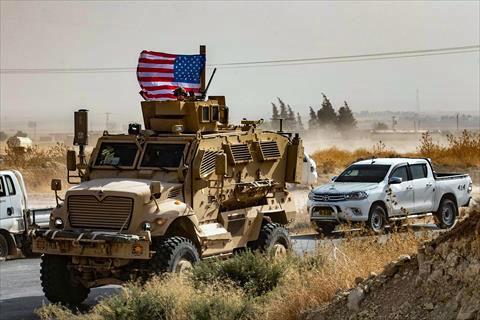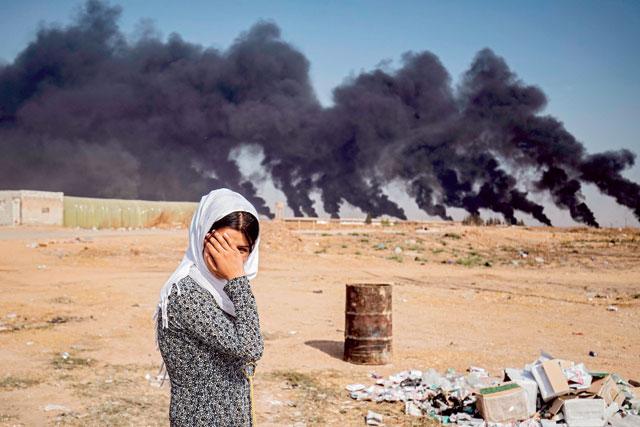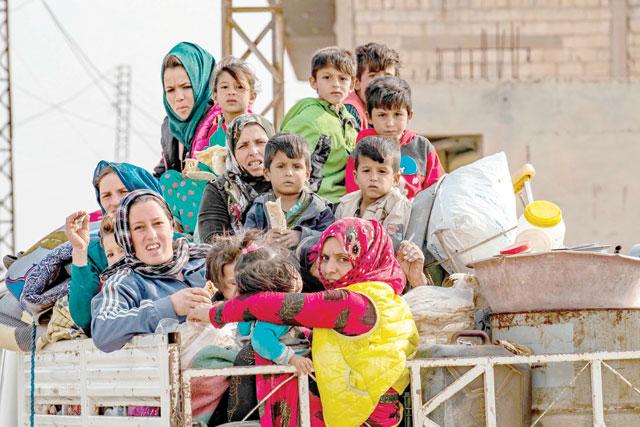You are here
Turkey launches assault on Syrian Kurds
By AFP - Oct 10,2019 - Last updated at Oct 10,2019

Smoke billows following Turkish bombardment in the northeastern town of Ras Al Ain in Syria's Hasakeh province along the Turkish border on Wednesday (AFP photo)
RAS AL AIN, Syria — Turkey launched an assault on Kurdish positions in northern Syria on Wednesday with air strikes and explosions reported near the border.
President Recep Tayyip Erdogan announced the start of the attack on Twitter, labelling it "Operation Peace Spring".
Moments later, a cloud of white smoke rose over the Ras Al Ain border area, an AFP correspondent said, adding that warplanes could be seen flying overhead.
"Our mission is to prevent the creation of a terror corridor across our southern border, and to bring peace to the area", Erdogan wrote, adding that the operation would target Kurdish militants and Daesh terror group.
The Syrian Observatory for Human Rights, a Britain-based war monitor, reported that Turkish air strikes had hit Ras Al Ain area.
Turkey's Anadolu news agency reported shelling of Kurdish militant positions in the border town of Tal Abyad.
Syria's Kurds called up civilians on Wednesday to defend against the assault, while President Donald Trump insisted the United States had not abandoned its Kurdish allies who were a crucial ally against Daesh.
Trump was widely seen as giving a green light at the weekend, ordering the pullback of US troops from the Turkey-Syrian border which had served as a buffer.
Russian President Vladimir Putin urged Erdogan to "think carefully" before any offensive in a phone call.
But Ankara says the assault is necessary to curb the power of the Kurdish-led Syrian Democratic Forces (SDF) due to their ties with Kurdish insurgents inside Turkey.
Turkey also wants a "safe zone" on the Syrian side of the border where it could send back some of the 3.6 million refugees it hosts from the eight-year civil war.
'General mobilisation'
Kurds have been girding for combat as Turkey sent a large convoy of troops and vehicles to the border area overnight.
"We announce three days of general mobilisation in northern and eastern Syria," Kurdish authorities in northern Syria said, urging all civilians to "head to the border with Turkey... to resist during this delicate historical moment".
They said they would hold their erstwhile US ally and the whole international community responsible for any "humanitarian catastrophe" that unfolds.
The Kurds say Ankara's real goal is to dilute their demographic dominance of the northeast with an influx of mostly Sunni Arab refugees from other parts of the country now living in south-western Turkey.
In Ras Al Ain, Kurdish-led security forces set up new checkpoints and stockpiled tyres to set alight to blur the vision of Turkish military pilots, an AFP correspondent reported.
Ras Al Ain was one of the places from which US troops withdrew on Monday.
Kurdish authorities in the town called for protesters to gather at the border later on Wednesday and hoisted flags on tents.
"We will not leave this land," said Kawa Sleem, a 32-year-old Ras al-Ain resident.
"War has been chasing us for years, and everyday Erdogan threatens us with a new attack," he added, pledging to defend the area with "all means available."
Ras Al Ain is one of the first areas on which Ankara's planned offensive is expected to focus. Like Tal Abyad, further west, its population is mainly Arab.
Kurdish forces have dug trenches and tunnels in both areas, covering streets with metal canopies to block the cameras of Turkish drones.
'Massive opposition'
The Kurdish-led SDF took heavy losses in the US-backed campaign against Daesh in Syria which they led to its successful conclusion in March.
Trump has faced a barrage of criticism, including from close allies in Washington, for appearing to leave US allies to their fate.
Senior Republican Senator Lindsey Graham addressed a tweet to the Turkish government saying, "You do NOT have a green light to enter into northern Syria.”
"There is massive bipartisan opposition in Congress, which you should see as a red line you should not cross."
There has also been a chorus of international concern, including from US allies.
French President Emmanuel Macron is "very worried" about the planned Turkish operation, an aide told AFP on Wednesday.
Russian Foreign Minister Sergei Lavrov said that Iraqi Kurdish leaders he met earlier this week had voiced deep concern about the risks of the mixed signals from Trump.
"They are extremely alarmed that such a lightweight treatment of this extremely delicate subject could ignite the entire region," Lavrov said.
Since 2015, Russia has been the main military backer of the Syrian government, which has seized on the policy shift from Trump to try to persuade the Kurds to accept the restoration of central government control.
The Kurds called on Moscow on Wednesday to facilitate dialogue with Damascus.
They have warned that a Turkish offensive would reverse the military gains achieved against Daesh and allow the extremist group's surviving leaders to come out of hiding.
While a Kurdish-led operation earlier this year saw the end of Daesh's territorial caliphate, the organisation is not dead and sleeper cells have been active in several parts of Syria and Iraq.
Daesh claimed an overnight suicide attack by two of its fighters in its former Syria stronghold of Raqqa.
Turkey said it would not allow a resurgence of Daesh, but called on European countries to repatriate extremist prisoners being held in Kurdish detention centres.
Related Articles
QAMISHLI, Syria — US forces in Syria started pulling back on Monday from Turkish border areas, opening the way for Ankara's threatened milit
CEYLANPINAR, Turkey — Turkey rebuffed international pressure to curb its military offensive against Kurdish militants in Syria on Wednesday
RAS AL AIN, Syria — The Kurdish-led Syrian Democratic Forces (SDF) fully withdrew from a Turkish-encircled town in northern Syria on Sunday,



















